It is much better for our health not to treat any ARVI, but not to allow it to occur. But if you still could not avoid a cold, which antiviral agent is best used for treatment. There are many drugs on the Russian pharmaceutical market today, but which drugs are really worth taking for ARVI.
Why is it so important to treat ARVI
Our people do not consider ARVI to be a serious disease and "treat" it with hot tea with honey and raspberries. We often carry the infection on our feet without realizing that it could have dangerous consequences for us. In addition, in such a situation, we infect others with a virus, when there are many antiviral agents.
By taking these drugs, we reduce the risk of complications such as otitis media, sinusitis, pneumonia, and bronchitis. By taking antiviral drugs, we protect our home and others from the spread of infection.
Even more troubles can bring ARVI to children, since it is they who most often have consequences in the form of ENT diseases or pneumonia. If a child too often catches a cold, then his immune defense is suppressed, allergic reactions often occur, and psychophysical development slows down. If the parents begin to take any antiviral agent on time, and also give it to the child for prophylaxis, this will help to avoid infection and further undesirable consequences.
Antiviral agents, widely used for colds, viral diseases and influenza, can be conditionally divided into several groups:
- Immunostimulants are drugs that for a short time increase non-specific immunity, promote the production of interferon;
- Vaccines are special sera that stimulate the secretion of antibodies even before the onset of the disease.
These drugs, acting on the replication of the virus, block its reproduction. They can be based on both natural and synthetic origin, and are used as preventive measures against influenza and SARS, or for the treatment of these diseases. Generally respiratory diseases of viral etiology, modern anti-influenza drugs of a wide spectrum of action, drugs against cytomegalovirus and antiherpes are treated.
If ARVI has a severe course, then antiviral drugs are prescribed, with a mild form of infection, treatment with interferons is permissible. As already specified, there are chemical and homeopathic antiviral drugs, in addition, they are subdivided into interferons and immunomodulators. Each of these groups is noteworthy.
Synthetic antiviral agents
There is a whole list of synthetic antiviral agents that are actively used in therapy colds... These are quite effective drugs, and relatively inexpensive, among which Arbidol, Tamiflu, Acyclovir and Remantadin are worth highlighting. The safest of these is Acyclovir, but its action, unfortunately, is limited to infections caused by the Epstein-Barr virus.
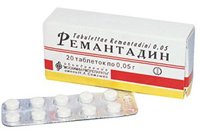 This is perhaps the most affordable antiviral agent in terms of cost. It is produced both in syrup and in tablet form. The drug has a high efficiency against A-group viruses, especially at the beginning of infection with ARVI. Usually Remantadine is prescribed during epidemics of influenza, is contraindicated in children under one year old and pregnant women. Remantadine can cause side effects such as headache and dizziness, nausea-vomiting syndrome, increased fatigue and decreased attention, delayed reaction, tachycardia. On average, Remantadine will cost 50-170 rubles.
This is perhaps the most affordable antiviral agent in terms of cost. It is produced both in syrup and in tablet form. The drug has a high efficiency against A-group viruses, especially at the beginning of infection with ARVI. Usually Remantadine is prescribed during epidemics of influenza, is contraindicated in children under one year old and pregnant women. Remantadine can cause side effects such as headache and dizziness, nausea-vomiting syndrome, increased fatigue and decreased attention, delayed reaction, tachycardia. On average, Remantadine will cost 50-170 rubles.
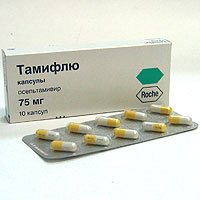 This is the latest generation of ARVI remedy, very effective against influenza infection. Tamiflu drugs are equally effective at any stage of infection. Studies show that after taking it, the duration of the fever and the risk of complications are halved. But, unfortunately, the remedy has a lot of side reactions, among which the most harmless are cough, lethargy, dizziness, diarrhea, nausea and headache... Tamiflu, according to researchers from Japan, is capable of provoking mental disorders, causing depression, psychosis or suicidal tendencies. Due to such a bouquet of side effects, Tamiflu is categorically forbidden to be taken by young children under 12 years of age. As for taking during pregnancy and lactation, the issue is controversial, so the doctor must make the decision. In addition to such adverse reactions, the drug has one more difference; the prohibitively high price of 1000-1400 rubles.
This is the latest generation of ARVI remedy, very effective against influenza infection. Tamiflu drugs are equally effective at any stage of infection. Studies show that after taking it, the duration of the fever and the risk of complications are halved. But, unfortunately, the remedy has a lot of side reactions, among which the most harmless are cough, lethargy, dizziness, diarrhea, nausea and headache... Tamiflu, according to researchers from Japan, is capable of provoking mental disorders, causing depression, psychosis or suicidal tendencies. Due to such a bouquet of side effects, Tamiflu is categorically forbidden to be taken by young children under 12 years of age. As for taking during pregnancy and lactation, the issue is controversial, so the doctor must make the decision. In addition to such adverse reactions, the drug has one more difference; the prohibitively high price of 1000-1400 rubles.
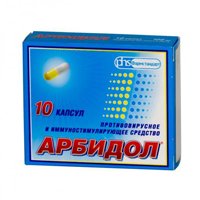 Arbidol's preparations are broad-spectrum antiviral agents that suppress viruses of groups A and B. There are practically no negative reviews about the drug, but the instructions indicate that Arbidol can cause Quincke's edema, stomach pain and all sorts of dermatitis. That is why this antiviral agent is not allowed to be used to treat children under 3 years of age. The cost of the drug Arbidol is ambiguous and can be 140-600 rubles.
Arbidol's preparations are broad-spectrum antiviral agents that suppress viruses of groups A and B. There are practically no negative reviews about the drug, but the instructions indicate that Arbidol can cause Quincke's edema, stomach pain and all sorts of dermatitis. That is why this antiviral agent is not allowed to be used to treat children under 3 years of age. The cost of the drug Arbidol is ambiguous and can be 140-600 rubles.
Immunomodulators
This is perhaps the most extensive group of antiviral drugs that stimulate the production of their own interferon, which will subsequently fight the virus. The most popular drugs in this group are Imudon, Immunal, Methyluracil, Ribomunil, Isoprenosine, etc. These drugs are not used to treat acute respiratory viral infections, since the first manifestations of its action begin to be felt after a half-month intake.
Immunal
The drug mainly consists of echinacea juice, which has a specific effect on the body, resulting in a significant increase in resistance to ARVI. Due to the increase in the number of white blood cells and their increased ability to phagocytosis, microorganisms cannot penetrate into the body, and if they succeed, they are instantly destroyed by antibodies.
Experts do not advise taking Immunal during lactation and pregnancy without medical advice. The drug is available in the form of tablets or nasal drops, the cost of which can be 240-280 rubles.
Interferons
In case of colds in babies, it is recommended to use antiviral drugs from the interferon group, since they are the safest and have a wide spectrum of action. These drugs have mostly positive reviews, since they have shown high efficiency against most of the existing pathologies of viral etiology. Interferon has an active effect on all possible ARVIs, and since it is produced in our body, the only negative reaction to its presence may be caused by hypersensitivity to a foreign protein.
Practice shows that taking such antiviral drugs for ARVI, you can get rid of a cold in a day or two, and the effectiveness of interferons is the same at all stages of infection. Medicines of the interferon group are available in the form of injections, nasal drops and suppositories. Among the most famous drugs in this group, it is worth highlighting Viferon, Grippferon, Cycloferon, Kipferon, etc. These drugs can even be used in the treatment of infants, and the low price of Interferon (about 50-100 rubles) makes it even more remarkable and affordable. Viferon and Kipferon are produced in candles, but Viferon has a synthetic base, which is why it has a smaller spectrum of side reactions.
Experts do not recommend using antiviral drugs like Amiksin, Neovir or Cycloferon in the treatment of bronchitis and colds, since they contribute to the production of interferon not immediately, but after some time. It is advisable to take these drugs only as a prophylaxis.
Separately, a new drug for the treatment of ARVI Derinat should be distinguished from this group. This is also a very effective immunostimulant, but it starts to work much faster, providing a rapid synthesis of interferon to the child's body. The product is available in the form of nasal drops, which makes it easier to use even when treating babies. Derinat's drugs do not have age-related contraindications, which is confirmed by numerous reviews.
For example, Svetlana from Tyumen claims that “I am very pleased with the drops. I took them during pregnancy. She cured ARVI almost instantly. "
But Catherine writes: “I treated my daughter with these drops for 3 months. The infection receded, not having time to start, probably, the beginning to treat on time ”.
Hence, it follows that Derinat is a universal children's medicine for colds. On average, the price of drops is 230-300 rubles.
Homeopathic medicines
Medicines of this group began to be used quite often in the treatment of colds and respiratory pathologies in children, and in older patients too. The most famous of them are Vibrukol, Aflubin, Otsillococcinum. It is very difficult to understand the effect of these drugs, but they somehow activate the immune system, that is, they have an immunostimulating effect. The average price of a drug, for example, Oscillococcinum, is 340-1150 rubles. (6-30 doses).
In general, taking antiviral drugs helps to reduce the duration of the ARVI course by several days, reduces the possibility of getting a complication from an infection or exacerbation of existing pathologies of a chronic form.
ARVI, ARI are lungs in their course and influence on the human body, diseases. In the vast majority of cases, our body can independently cope with acute respiratory viral infections, without the use of drugs, both pharmacology and traditional medicine... Moreover, the real treatment at the first stage of the disease will be fresh air in the room, constant ventilation, drinking plenty of fluids, keeping to a diet, and warm clothes. But, we most often resort to pills, powders, syrups, as soon as we start coughing, our temperature rises, a runny nose begins, and our head hurts. And here it is very important to choose the right medicine for ARVI, ARI, so as not to harm.
Considering that absolutely all drugs for ARVI are dispensed from a pharmacy without a prescription, 99% of patients are prescribed drugs for the treatment of sore throats, inflammatory processes of the upper respiratory tract, headaches, dry / wet / irritating cough, high body temperature - on its own.
It is impossible to eliminate self-medication of the population, but it is possible to reduce the risks from such therapy.
The need for treatment
We remind you that in the overwhelming majority of cases, ARVI does not require drug treatment. Acute respiratory infections are a condition in the body that the internal resources of the immune system are able to cope with on their own.
ARVI treatment is necessary only in situations such as:
- ARVI with consequences that pose a threat to human health and life;
- Acute bacterial respiratory infections;
- Chronic bacterial infections;
- Complications after ARVI;
- Symptomatic treatment of cough, runny nose, high temperature, sore throat.
Antiviral drugs
Antiviral drugs are used in the event that ARVI, in its severity, becomes influenza. Effective medications for influenza are:
- Amantadine (rimantadine) - are active against influenza A. It is prescribed at an early stage of the disease, on the first day or two. Reduces the risk of influenza complications, improves well-being. It is not recommended to use it for more than 5 days, as the body becomes resistant to the active substances of the drug.
Amantadine preparations: Viregrit-K, Gludantan, Midantan, Neomidantan.
Rimantadine preparations: Algirem, Remavir, Remantadin, Rimantadin-STI, Rimantadin-UVI, Rimantadin-FPO, Flumadin.
- Oseltamavir / Zanamivir - effective anti-influenza drugs, an order of magnitude higher in cost than Amantadine and Rimantadine. Eliminate the manifestations of influenza A, influenza B. Please note that Zanamavir preparations are not recommended to be taken in tablets, since they are practically not absorbed into the gastrointestinal tract, therefore, they are recommended to be used as inhalation.
Zanamavir preparations - Relenza; Oseltamavir preparations - Tamiflu.
- Ribavarin is not recommended for influenza because of its many side effects. The main indications for the use of Ribavarin are: pneumonia, bronchiolitis. This drug is used in a nebulizer.
Ribavarin preparations: Arviron, Virazol, Copegus, Rebetol, Ribavin, Ribavirin Bio, Ribavarin Verte, Ribavarin Meduna, Ribapeg, Trivorin.
Interferons
Interferon is a protein that is synthesized by the cells of our body. Interferon, by its properties, has a pronounced antiviral activity. how medicinal product interferon is released as:
- Natural interferon synthesized from donated blood;
- Artificial interferon obtained from bacteria, which produces interferon under the influence of engineering technologies.
In the pharmacy you can find "human leukocyte interferon dry" in powder form. Before use, the product is diluted in boiled water. The dosage is as follows - for one ampoule of interferon, 2 ml of water is taken. The result is a red solution that can be used as nasal drops or as inhalation. The dosage for inhalation is as follows - we take 3 ampoules of interferon and dilute in 10 ml of water, keeping the temperature of the medicinal solution at about 37 degrees.
Advantages of human interferon:
- Has no side effects;
- Well tolerated by both adults and children;
- Suitable for small children from a year and older.
Lack of human interferon:
- The drug is made from human blood, and this does not exclude the risk of contracting infections, since not all human infections are known today.
Preparations of natural interferon: Interlock, human leukocyte interferon in suppositories, human leukocyte interferon liquid, dry human leukocyte interferon, Leukinferon, Lokferon, Sveferon, Suppositoferon.
Artificial interferons
Artificial interferons are made from synthetic materials, so the risk of contracting human infections is reduced. Indications for the use of interferon: malignant diseases, viral infections, hepatitis, herpes, HIV, prevention and treatment of ARVI in children with very weak immunity.
Artificial interferon preparations: Viferon, Grippferon, Interal, Infagel, Reaferon, Laferobion.
Interferon inducers
Indications for the use of interferon inducers are: infectious mononucleosis and adenovirus. Among effective drugs interferon inducers are distinguished: Amiksin, Arbidol, Dipyridamole, Kagocel, Lavomax, Neovir, Poludan, Ridostin, Tiloron, Cycloferon.
Summary
Acute respiratory viral infections do not need to be treated with drugs; this is a disease that goes away on its own without therapy. The only thing that needs to be observed is drinking plenty of fluids, warm clothing, diet, and airing the room. Medicines are used only in cases of low immunity, with complications, influenza, severe acute infections.
ARVI is one of the most common diagnoses made by doctors in the autumn-spring season. Infections are caused by various pathogens, so a person can suffer up to 7 cases of colds in a year. With ARVI, you cannot follow the principle "I will not be treated, it will pass by itself." After all, the main danger comes from complications that an infection can cause.
Various medicines are used to treat ARVI.
Treatment of acute respiratory infections is imperative. At the same time, it is not the number of days for which the disease will pass to the fore, but the quality of treatment - that is, how much it will be possible to prevent the development of complications. Treatment of ARVI in adults with drugs is aimed, on the one hand, at suppressing the harmful infectious microflora, and on the other, at reducing and eliminating clinical manifestations disease. Also useful are auxiliary warming procedures, inhalation and taking medications that increase the body's immune functions.
Systemic therapy
To suppress viruses, specific antiviral drugs, drugs containing the immune protein interferon, or interferon inducers - drugs that activate the production of their own human interferon can be used.
Specific antiviral agents (Remantadin, Zanamivir) are quick to act. Medicines in this group are distinguished by a narrow spectrum of action, therefore, they can be used to combat a limited number of types of pathogens. This significantly limits the possibilities of drugs in the treatment of ARVI.
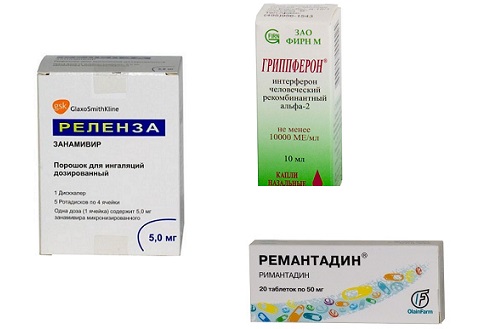
These funds are used to eliminate the symptoms of ARVI
Interferon preparations (Grippferon, Viferon) affect a greater number of pathogens. Like specific antiviral agents, they begin to act almost immediately after use. Available in the form of injections, suppositories, drops.
Means that activate the synthesis of their own interferon (Cycloferon, Amiksin) do not act so quickly - on average, 6 hours after application.
There are drugs for ARVI that have a complex effect: on the one hand, they stimulate the synthesis of interferon, on the other hand, they affect the virus, causing its death. Often used for the treatment of ARVI in adults, the drug Arbidol, which has such properties.
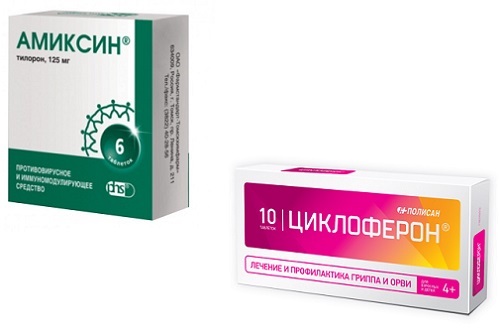
The presented drugs are used to activate the synthesis of their own interferon
Antibiotics for ARVI in adults are not prescribed, since they affect bacteria, while viruses are the causative agents of ARVI.
However, with the addition of a bacterial infection to a viral disease and the development of complications, the use of antibiotics becomes reasonable and expedient.
ABOUT Folk remediesused to treat ARVI in adults, see the video:
Symptomatic therapy
Assumes the appointment of drugs to eliminate the common cold, cough and temperature, fortifying agents.
To lower the temperature, non-steroidal anti-inflammatory drugs are used - Paracetamol, Ibuprofen. Funds reduce inflammatory process, contribute to the normalization of body temperature, eliminate pain and aches in muscles and joints. In terms of the severity of the anti-inflammatory and antipyretic effect, paracetamol is inferior to ibuprofen, but it is less toxic. The average daily dose of paracetamol for children over 12 years of age and adults is 2 g (500 mg per dose). Usually, this dosage is sufficient to obtain the desired antipyretic effect.
The temperature should not be lowered below 38 ° C.
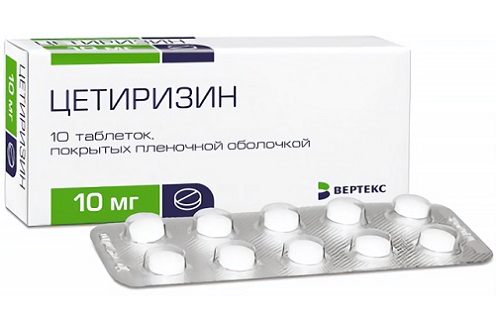
Cetirizine will help relieve inflammation and swelling
Antihistamines are used to eliminate swelling of the mucous membranes of the respiratory tract, to reduce capillary permeability. The drug of choice today is Cetirizine, a new, second generation antihistamine. On the one hand, cetirizine has a pronounced anti-inflammatory and anti-edema effect, relieves nasal congestion and improves nasal breathing. On the other hand, cetirizine has an indirect antiviral effect against rhinoviruses - it prevents their penetration into healthy cells of the body. Rhinoviruses cannot penetrate into cells and die after a short time. Thus, cetirizine inhibits the development of infection. However, it should be emphasized that the antiviral activity of cetirizine occurs only in relation to rhinoviruses.
First-generation antihistamines (Diphenhydramine, Suprastin, Tavegil) are rarely used, since they affect the central nervous system, causing fatigue and drowsiness. The drugs of the new, second and third generation - cetirizine, loratadine, desloratadine - do not have a depressing effect on the central nervous system.
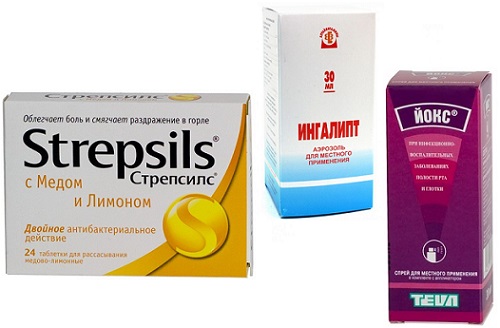
Antiseptic and bactericidal agents are effective against sore throat. Available in the form of lozenges (Strepsils, Septolete, Falimint), aerosols (Ingalipt, Yoks, Strepsils plus) and rinsing solutions (Yoks). Gargling with decoctions of medicinal plants - chamomile, calendula, eucalyptus, sage, oak is also effective. You can use solutions of furacilin, potassium permanganate, soda, saline solution... Rinsing procedures will be effective if they are regularly carried out frequently - at least once every 2-3 hours.
Vasoconstrictor nasal and sprays reduce swelling of the nasal mucosa and improve their patency.
It should not be forgotten that vasoconstrictor drops with prolonged use, they can cause the opposite effect - an increase in the common cold and the development of a chronic form of the common cold.
In addition, haphazard instillation of the nose with drops with a vasoconstrictor effect provokes a thickening of the nasal mucosa, as a result of which dependence and addiction to the drug develops, and permanent nasal congestion is formed. It is impossible to correct such a complication without surgery.

For nasal congestion, drop drops
The choice is determined by the nature of the cough reflex and the secreted sputum. The main principle of cough treatment is to increase its effectiveness, since the act of cough itself is a natural reflex aimed at clearing the airways from foreign bodies, including bronchial secretions. Therefore, suppressive cough reflex is used only in case of unproductive, obsessive, painful cough, which is not accompanied by sputum production. The appointment of an antitussive agent should only be carried out by the attending physician.
In other cases, antitussive drugs are prohibited. They can cause congestion in the lungs and trigger the development of pneumonia.
Drugs for treatment wet cough contribute to the liquefaction of viscous, difficult to separate secretions (, ACC, Fluditek), restore mucociliary transport and the work of the ciliated epithelium of the mucous membrane, facilitate the excretion of sputum from the lumen of the bronchi (expectorant drugs Lazolvan, Ambroxol,).
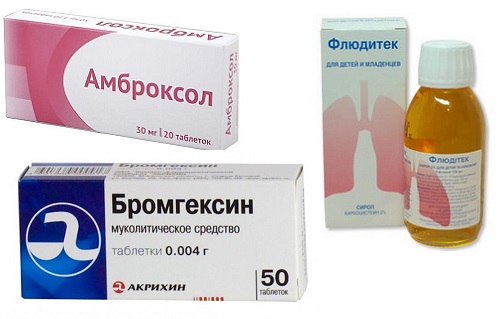
Medication is necessary for wet coughs
To increase the effectiveness of therapy along with drug treatment ARVI in adults with drugs, it is necessary to carry out auxiliary procedures:
- Patients with acute respiratory viral infections are shown bed rest, the violation of which can lead to a worsening of the condition and the development of complications.
- Consumption of large volumes of warm liquid (up to 2 liters per day) allows you to quickly remove toxins (waste products of viruses) from the body and thus helps to eliminate intoxication syndrome.
- Useful with alkaline solutions, decoctions of medicinal herbs.
- The nutritious diet should include light, wholesome food, mainly vegetable, high in vitamins.
A useful video by Dr. Komarovsky on how to treat ARVI in a child without any drugs, but it is also applicable to adults:
Some of us prefer independent treatment and from the first day of the disease begin to take antibacterial drugs... This should not be done!
The antibiotic is effective only against bacteria, and the virus is the cause of ARVI. The use of an antibiotic is justified only in the case of a bacterial infection.
Antiviral medicines
Antiviral drugs for ARVI are recommended to be taken at the first manifestations of the disease. At the initial stage of the development of the disease, pathogenic viruses actively multiply and spread throughout the body, and taking these medications will stop this pathological process.
The most effective antiviral drugs with ARVI are as follows:
Interferon inducers
Medicines of this type are used to stimulate the production of their own interferons in the body of a sick person.
These drugs are used for ARVI, influenza and other viral diseases. These medicines include:
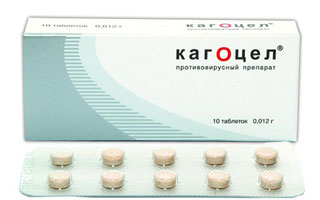
Interferon preparations
Interferons are proteins secreted by body cells that are already infected by viruses. Thus, they "inform" neighboring cells that an infectious agent has entered the body and that the virus needs to be eliminated.
- Recombinant interferon alfa-2b is a commercially produced drug that does not contain human blood components. The tool has a powerful antiviral effect, prevents cell destruction, stimulates the body's defenses, has an antioxidant effect. This group includes Grippferon, Viferon - these are highly effective drugs for the treatment of ARVI and influenza. Gripferon is produced in the form of nasal drops. Viferon - in the form of an ointment for the nasal cavity and rectal suppositories.
- Recombinant interferon gamma is a medication created by the method of genetic engineering, which does not contain human blood elements. The medicine has antiviral, immunomodulatory, immunostimulating effect. The representative of this group is the medicine Ingaron. The medication is used for the prevention and treatment of ARVI and influenza. Release form - solution for intranasal use.
ARVI therapy in childhood
 If symptoms of ARVI occur in a child, you should definitely consult a doctor. Only a qualified specialist will be able to make the correct diagnosis and prescribe the most appropriate children's antiviral drugs for ARVI. Many of the above medicines can be used for children, taking into account the age of the sick child.
If symptoms of ARVI occur in a child, you should definitely consult a doctor. Only a qualified specialist will be able to make the correct diagnosis and prescribe the most appropriate children's antiviral drugs for ARVI. Many of the above medicines can be used for children, taking into account the age of the sick child.
- Arbidol can be used to treat children after 3 years of age.
- It is prohibited to use remantadine for children under 7 years of age.
- Tamiflu is prescribed for children after 1 year.
- Orvirem in syrup form can be used for children from 1 year old.
- The drugs Interferon gamma (nasal drops) and Interferon alfa (rectal suppositories) can be used to treat children almost from birth.
- Oxolinic ointment is used to prevent colds in both adults and children of any age.
Remember - only a specialist can draw up an adequate therapeutic program and select the most suitable drugs against ARVI. Self-medication, especially for children, can be dire.
Antiviral drugs are made up, since the main causative agent of the disease is a virus. Such drugs differ in the degree of impact on the human body, the presence of certain contraindications and side effects. It is recommended to take them under the supervision of the doctor who made the diagnosis.
Antibiotics are useless in the treatment of ARVI, therefore they are never prescribed. The most effective drugs used for viral respiratory infection, are considered:
- Arbidol;
- Kogatsel;
- Rimantadine;
- Cycloferon;
- Amiksin;
- Rinza.
Arbidol for ARVI
Arbidol - an antiviral and immunostimulating drug based on a substance called umifenovir, produced in the form of hard-coated tablets and capsules. The composition also contains a small proportion of titanium dioxide, calcium stearate, sugar, gelatin, acetic acid.
The main indication for taking Arbidol is diseases such as ARVI, including in the presence of complications from respiratory system,. The drug is recommended to be taken as part of therapy, rota viral infection, for preventive purposes to prevent the development of ARI, ARVI.
Among the side effects from taking the drug are known, its main contraindication is early childhood, intolerance to the components.
The daily norm of Arbidol for an adult is 200 mg, for a child from 6 to 12 years old - 100 mg, for a child from 3 to 6 years old - 50 mg. The drug should be taken before meals with plenty of water.
Kagocel for ARVI
Kagocel - Russian antiviral drug, the action of which is aimed mainly at stimulating the production of interferon protein by the human body, which helps to destroy infectious agents of viral origin. The main form of release is oral tablets.
The drug is prescribed for the prevention and treatment of ARVI, including as an adjuvant in therapy. Side effects dangerous to human life from taking Kagocel have not been identified, cases of overdose have not been established. The remedy is contraindicated in pregnancy, in case of intolerance to its components, it is also not recommended for the treatment of children under 3 years of age.
The course of treatment is 4 days. On the first day, 2 tablets are taken three times a day, on the remaining days - 1 tablet also three times a day. As a preventive measure, Kagocel is taken 2 tablets twice a day for 2 days. The drug is repeated after 5 days.
As clinical studies show, this agent is safe, completely excreted from the body, does not accumulate in its tissues, and does not cause cell mutations.
Rimantadine for ARVI
Rimantadin - a powerful antiviral drug derivative chemical called adamantane, active against various viruses, including tick-borne encephalitis and influenza, has an immunostimulating effect on the human body, reduces the symptoms of intoxication. The main indication for use: ARVI, caused in particular by the strain of the influenza A virus, the agent is recommended to be taken within the first 18 hours from the moment the first signs of the disease appear. Rimantadine is available in the form of tablets and syrup, is contraindicated in pregnancy and lactation, intolerance to the components of the drug, liver failure, is not prescribed for the treatment of children under 1 year of age. Side effects include nausea and vomiting, dryness, an unpleasant taste in the mouth, loss of appetite, fatigue, headache, dizziness. Signs of a violation of the central nervous system are possible.
The maximum daily intake of the drug is no more than 150 mg for a child and no more than 200 mg for an adult. The course of treatment lasts 7 days. Rimantadine is taken before meals, twice a day, 100 mg, for prophylactic purposes - 100 mg once a day.
Cycloferon for ARVI
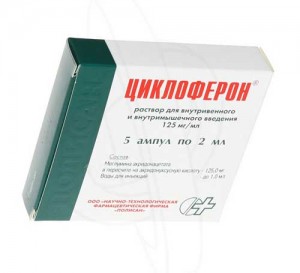 Cycloferon - a drug based on meglumine acridone acetate, a substance that promotes the production of interferon protein by the body, is produced in the form of coated tablets. This remedy is prescribed for various viral infections, including for the purpose of strengthening immunity during the cold and flu season.
Cycloferon - a drug based on meglumine acridone acetate, a substance that promotes the production of interferon protein by the body, is produced in the form of coated tablets. This remedy is prescribed for various viral infections, including for the purpose of strengthening immunity during the cold and flu season.
Cycloferon is known in the world as a powerful immunostimulating drug, its appointment is advisable for patients with a diagnosis of hepatitis, with oncological diseases as a stimulator of the body's defenses. Among the contraindications: pregnancy, breast-feeding, cirrhosis of the liver, children's age (up to 4 years), intolerance to any components of the drug. Serious side effects from taking Cycloferon have not been identified. Possibly insignificant.
The drug interacts well with antiviral agents, chemotherapy drugs, other stimulants of interferon production. With ARVI, the daily rate of Cycloferon is 6 tablets. The course of treatment lasts no more than 10 days. The remedy is taken half an hour before meals, 3-4 times a day. Experts recommend taking Cycloferon as prevention of acute respiratory infections in the autumn-winter period.
Amiksin for ARVI
Amiksin - an antiviral, immunostimulating agent based on tilorone, recommended for use as main therapy and prevention viral diseases, including SARS, hepatitis A, B, C, herpes,. The main form of release of the drug is film-coated tablets.
Amiksin is contraindicated in the presence of hypersensitivity to its components, pregnancy, lactation; it is also prohibited to take the drug for children under 7 years of age. The remedy works well with antibiotics and other medications prescribed in the treatment of a viral infection. As side effects noted: indigestion, short-term chills,.
The daily norm of Amiksin is 125 mg in the first 2 days after the onset of symptoms of the disease, 125 mg 4 days after the first dose of the drug. The course of treatment is 3 days in total, the total dose of the drug should not exceed 750 mg.
Rinza with ARVI
Rinza - a drug based on paracetamol, designed to eliminate the main symptoms of ARVI. It also contains phenylephrine hydrochloride, caffeine and chlorphenamine maleate. Rinza has an anti-inflammatory, antipyretic, mild analgesic effect on the human body, helps to eliminate headache, muscle, joint pain, drowsiness, normalizes body temperature, increases the efficiency of the central nervous system, is available in the form of tablets for oral administration.
The drug interacts well with stimulants of interferon production, antihistamines, antiviral agents, enhances the effect of diuretics on the body, it is not recommended to be taken together with barbiturates, some types of antidepressants. As side effects are possible: insomnia, skin rash, dyspeptic disorders, anemia, renal colic. Rinza should not be taken by pregnant women, nursing mothers, persons with severe diabetes mellitus, arterial hypertension, children under 15 years of age.
The maximum daily dose of the drug is 4 tablets. The duration of the therapeutic course is 5 days.
